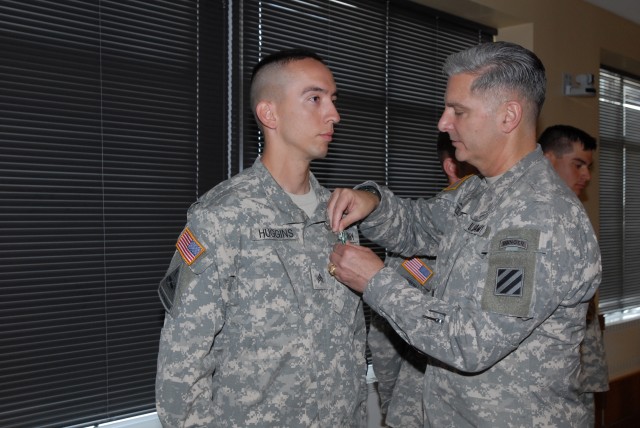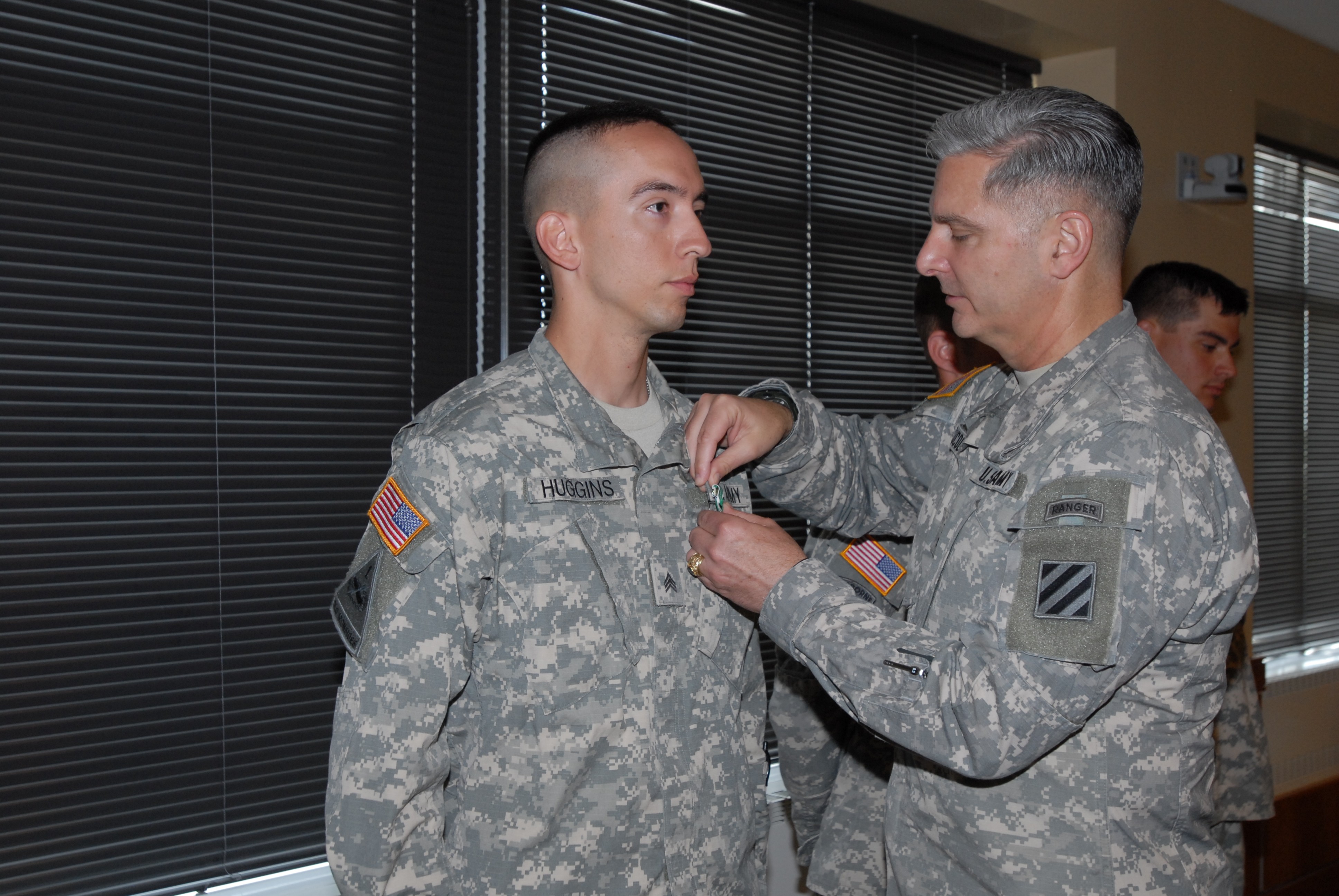FORT STEWART, Ga. - Sergeant John Huggins knew the signs. The two-time combat veteran had been thoroughly trained at detecting the symptoms.
Army intervention classes provided this generator mechanic with enough scenarios that he was confident in his ability to help prevent someone from committing suicide, but the 4th Infantry Brigade Combat Team, 3rd Infantry Division Soldier said he never expected he'd actually have to apply that training.
"Instinct pretty much kicked in," said Sgt. Huggins, who was pulling charge of quarters duty on Fort Stewart, April 13, when he was informed that a fellow Soldier was threatening to take his own life. "I just wanted to make sure that the Soldier had another chance."
A Soldier had essentially barricaded himself inside his second floor barracks room, making it nearly impossible for anyone to get to him, Sgt. Huggins recalled.
"He had his mind set," the noncommissioned officer said of the Soldier's intent to commit suicide, "Even just trying to get the door open so the (military police) could come in and take care of the situation was not an option."
But the challenge didn't deter Sgt. Huggins from using any means necessary to get the Soldier the help he needed. Using a step ladder off a contractor's truck, Sgt. Huggins climbed through the Soldier's barrack's window.
"I tried to keep the situation as calm as I could, keep his attention on me," Sgt. Huggins said as he put to use "ACE," the Army's suicide prevention methodology, until military police arrived.
ACE, which stands for Ask, Care, and Escort, reminds Troops to ASK their buddy if he or she is thinking about attempting to committing suicide, CARE for their buddy by calmly controlling a situation, and ESCORT their buddy to a behavioral health professional when necessary.
Sergeant Huggins said he knew it was his duty to care for the Soldier and credits recent suicide prevention training for mentally preparing him to intervene.
"The classes that the Army has been teaching helped out a lot," he said.
The 3rd ID and Fort Stewart-Hunter Army Airfield joined the Armywide fight to combat rising Soldier suicides with a "stand-down" suicide prevention class March 5. The class was intended to help increase Soldiers' awareness of suicidal behavior through an interactive video entitled Beyond the Front. The video introduces warning signs of suicide and encourages Soldiers to be proactive and seek help.
The Marne Division has continued to train Troops quarterly on suicide prevention, including a more recent video entitled Shoulder to Shoulder- No Soldier Stands Alone.
"(The training) allows people to open up and talk about things that they may not talk about in other venues," said Capt. Robert Gordon, Headquarters and Headquarters Company, 4th IBCT commander, who added that Sgt. Huggins is proof that the Army's suicide intervention classes are an effective approach to preventing Soldier suicides.
"Sergeant Huggins put himself in danger to protect the life of another Soldier," Capt. Gordon said. "That, to me, shows what being a Soldier is about, what a Soldier should be, and what we look for in NCOs. The standards and the values that he has, and what he stands for, is what we should all strive to have."
Major General Tony Cucolo awarded Sgt. Huggins for his standards and values with the Army Commendation Medal at Fort Stewart's Lt. Col. Keith L. Ware Command and Control Facility, April 30. The 3rd ID commanding general said Sgt. Huggins embodied all of the Army Values and proved that Soldiers like World War II hero, Audie Murphy still exist in today's ranks.
Though grateful to have been awarded for his actions, Sgt. Huggins said he was just doing his job as an NCO. He advises his peers to be proactive in preventing Soldier suicides.
"Follow your instincts," he said. "You know what feels right; you just have to exercise it. These are the Soldiers who are defending our country, and we as leaders need to make sure they are taken care of."
Stewart-Hunter continues to offer local support resources to help prevent Soldier suicides. The Division Mental Health can be reached by calling 767-7301 or 767-5718; the U.S. Medical Activity Department's Behavioral Health - Clinic's telephone numbers are 767-1647/1654; and Tuttle's Behavioral Health Clinic can be reached at 315-6430.
Army Community Service also lends its support; call 767-5808/5809 for ACS-Stewart or 315- 6816 for ACS-Hunter. Fort Stewart's Army Substance Abuse Program can be reached by calling 767- 5265/5267.
Other contact information includes the following:
Aca,!Ac Military One Source - 1-800-342-9647
Aca,!Ac National Suicide Prevention Hotline - 1-800- 273 TALK (8255)
Aca,!Ac Department of Veterans' Affairs Suicide Prevention Hotline - 1-800-273-TALK (8255)
Aca,!Ac VA Readjustment Counseling Services - 1-800- 827-1000, www.va.gov/rcs
Aca,!Ac American Legion Family Support Network - 1- 800-504-4098, familysupport@legion.org
Aca,!Ac National Military Family Association, Alexandria, Va. - 1-800-260-0218
Aca,!Ac Wounded Soldier and Family Hotline - has a 24- hour, 7-days-a-week operation. Call 1-800 984-8523 or DSN 328-0002.


Social Sharing